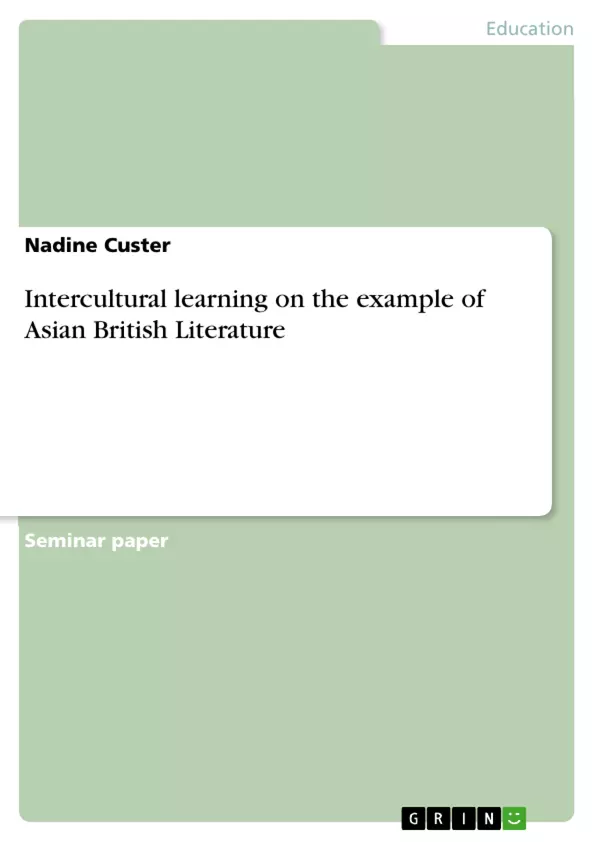Intercultural competence is an important goal to teach and learn. Times of teaching only the four skills are finally identified not to be enough for a necessary communication in a foreign language and in interaction between people of different cultures.
Inhaltsverzeichnis (Table of Contents)
- Introduction
- Bildungsstandards
- Competences
- Intercultural Competences
- Intercultural communicative Competence
- Culture
- Intercultural Learning on the example of literature
- Literature
- Black and Asian British Literature
- Teaching Proposal
- Learning Goals
- Object analysis
- Analysis of the short Novel
- Didactical Approach
- Methodological Approach
- Conclusion
- References
- Appendix
Zielsetzung und Themenschwerpunkte (Objectives and Key Themes)
This term paper aims to explore the importance of intercultural learning in the context of EFL classes, specifically focusing on the example of Asian British Literature. It argues that incorporating cultural understanding into language learning goes beyond simply teaching the four skills and is crucial for developing effective communication and interaction between individuals from different cultures.- The role of intercultural competence in EFL education
- The impact of multiculturalism in London and its relevance for EFL classrooms
- The significance of literature as a tool for intercultural learning
- The application of intercultural learning principles in a teaching proposal for a short story
- The development of intercultural competence as a key competence in the German curriculum
Zusammenfassung der Kapitel (Chapter Summaries)
The introduction establishes the context of the paper, highlighting the multicultural reality of London and the need to incorporate intercultural understanding into EFL classes. It outlines the paper's structure, focusing on the significance of intercultural competence, culture, literature, and a teaching proposal based on an Asian British short story.
Chapter one delves into the concept of Bildungsstandards and its emphasis on key competences, including intercultural competence. It discusses the evolution of the curriculum and the shift from focusing solely on the four basic skills to incorporating intercultural competence as a crucial aspect of language learning.
Chapter two defines the term "culture" and explains its meaning through the use of the iceberg model. It provides a framework for understanding the multifaceted nature of culture and its influence on intercultural interaction.
Chapter three explores the potential of literature as a tool for intercultural learning, specifically focusing on Black and Asian British Literature. It highlights the importance of engaging with diverse literary voices to promote cultural awareness and understanding.
Chapter four presents a detailed teaching proposal for an Asian British short story. It outlines the learning goals, object analysis, and didactic and methodological approaches, demonstrating how to incorporate intercultural learning principles into a classroom setting.
Schlüsselwörter (Keywords)
This term paper revolves around the core concepts of intercultural learning, Asian British literature, EFL education, Bildungsstandards, communicative competence, and teaching proposals. It explores the intersection of these concepts to demonstrate the importance of incorporating cultural understanding and awareness into the learning process.Frequently Asked Questions
Why is intercultural competence important in EFL classrooms?
Intercultural competence is crucial because language learning is not just about the four basic skills (reading, writing, listening, speaking), but also about effective communication and interaction between different cultures.
What is the "Iceberg Model" of culture?
The Iceberg Model is used to explain that most of a culture is "hidden" beneath the surface (values, beliefs, norms), while only a small part is visible (food, clothing, language).
How can literature facilitate intercultural learning?
Literature, especially Black and Asian British literature, provides diverse voices and perspectives that help students develop empathy and cultural awareness.
What role do "Bildungsstandards" play in cultural education?
The German Bildungsstandards emphasize key competences, moving the curriculum toward incorporating intercultural communicative competence as a core requirement.
What is included in the teaching proposal for Asian British literature?
The proposal includes learning goals, object analysis of a short story, and specific didactical and methodological approaches for the classroom.
- Quote paper
- Nadine Custer (Author), 2013, Intercultural learning on the example of Asian British Literature, Munich, GRIN Verlag, https://www.grin.com/document/265704



